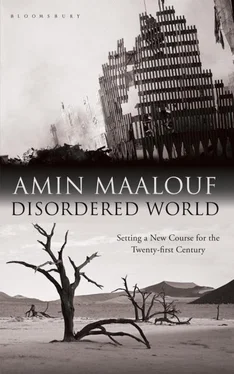America will get over its Iraqi trauma. Iraq will not get over its American trauma. Its largest communities will have suffered hundreds of thousands of deaths; its smaller communities will never recover their place — not just the Mandaeans or the Yazidis, but also the Assyro-Chaldaeans, whose very name evokes marvellous episodes in our great human story. Now the fate of all these minorities is sealed: at best, they will end their progress through history in some faraway place of exile; at worst, they will be annihilated on the spot, crushed between the twin jaws of today’s barbarism.
We contemplate earlier times with a condescension which, given our current behaviour, is unjustified. The century which recently ended certainly saw wonderful advances: many more of us live much longer and better; we have at our disposal tools and medicines which only a few centuries ago would have seemed to belong to the domain of science fiction if they were conceivable at all. But the same century also witnessed totalitarian regimes much more terrible than the tyrannies of earlier centuries and produced weapons which for the first time in history were capable of destroying all trace of civilisation on earth.
Does that mean that humanity progressed materially but not morally? That would not be quite true. We undeniably advanced in the course of the twentieth century on all fronts simultaneously, but not at the same speed. While in the acquisition of knowledge, in the development of science and its technological adaptation for civil and military ends, and in the production and distribution of wealth, change was rapid and upward, that of human behaviour was in the main inadequate, and tragically so.
Inadequate is the term which best describes our response to our current predicament. The relevant question is not whether our attitudes and behaviour have progressed in comparison to those of our ancestors; it is whether they have changed enough to allow us to face the enormous challenges of the contemporary world.
One example among many is that of the environment, atmospheric pollution and climate change. There has been a remarkable realisation of the importance of this previously neglected field, probably less marked in some countries than in others, but real and even spectacular. In a few decades, effective measures have been taken and centuries-old habits have been changed. When one recalls that in London in early December 1952, smog (a mix of smoke and fog) caused the deaths of twelve thousand people in five days, one can see how far we have come. In most industrialised nations, the authorities have taken steps to make factories less polluting and have banned the construction of new ones near large population centres. This is a healthy practice which has spread since the end of the Cold War to the countries of the former Eastern bloc, which previously had a dreadful track record in this regard.
This is progress we can be pleased about, but it is not enough to sweep away our current fears. Since the planet is suffering a warming that is speeding up as a result of our carbon emissions and could prove disastrous for future generations, it isn’t enough to ask ourselves, ‘Is our behaviour in this area better than that of our parents and grandparents?’ The answer to that question is undoubtedly yes. The relevant question is: ‘Will our behaviour in this area allow us to avoid the deadly threat which hangs over our children and grandchildren?’
It goes without saying that a positive answer to the first question would offer no reassurance if the answer to the second question turns out to be no. As I write, this cannot be ruled out. For if we want to reduce the carbon emissions in the atmosphere significantly, the world’s richest and most powerful people, notably those in America, Europe and Japan, would have to accept profound changes in their consumption habits; equally, the major nations of the South, whose economic take-off has only just begun, would have to agree to limit their growth.
In order to be able to impose such restrictive measures, which would demand serious sacrifices from every nation and every individual, there would have to be a major global step-change. There are no signs that this is imminent.
A similar discrepancy is apparent when it comes to the challenges posed by human diversity.
Today, with every culture daily confronting others and every identity experiencing the need for virulent self-affirmation, and every country and city having to organise a delicate coexistence, the question is not whether our religious, ethnic and cultural prejudices are stronger or weaker than those of previous generations; it is whether we will be capable of stopping our societies from drifting towards violence, fanaticism and chaos.
That is the situation in numerous regions of the world. The case of minorities in Iraq and the Middle East is not unique, though it has offered the most telling example in the first years of this century. If we turn out to be unable to ensure the survival of communities that have existed for centuries, the way we handle human diversity will have been proven deficient and inadequate.
That does not mean that in the past we were wiser, more attentive, tolerant, magnanimous or adept. A glance at a few history books is enough to show that there have always been bloodthirsty rulers, greedy despots, devastating invasions, pogroms, massacres and monstrous attempts at extermination. If some communities nonetheless survived century after century, it was because their fate was mainly linked to local vicissitudes and was not constantly affected by all the events on the planet.
When a serious incident took place in a village, it often took weeks for the rest of the country to hear of it, which limited its repercussions. Today the opposite is true: a clumsy pronouncement made at noon can serve as the pretext for slaughter that same evening ten thousand kilometres away. Sometimes it is a false rumour spread maliciously or through a misunderstanding which sparks violence. By the time the truth comes out, it is already too late: the bodies are piled up in the streets. I have in mind specific events that took place in the past few years, not just in Iraq but also in Indonesia, Egypt, Lebanon, India, Nigeria, Rwanda and the former Yugoslavia.
Some people may object that this is just a normal consequence of the evolution of the world. To which I would say, yes and no. The entanglement of men and conflicts is indeed natural a consequence of progress in communications. But what we have the right to deplore and denounce is that this technological advance has not been accompanied by an awareness that permits the preservation of peoples pitched against their will into the maelstrom of history.
What is at issue is the gulf that is opening up between our rapid material evolution, which brings us closer together every day, and our too slow moral evolution, which does not allow us to face the tragic consequences of our shrinking world. Of course, material progress cannot and should not be slowed. It is our moral evolution which must be considerably speeded up. It urgently needs to be raised to the level of our technological evolution, which demands a real revolution in attitudes.
I shall return later at greater length to the question of how we manage diversity as well as to climate change and our dilemmas in this crucial area. Here, I would like to focus for a moment on the turbulence in the economic and financial sector, in which we can see the same disparity between the scale of the problems which assail us and our feeble ability to resolve them.
Here, too, if it were a question of working out whether we will be able to act and think together better than in the past to mobilise emergency funds, the answer would certainly be yes. As soon as a crisis occurs, measures are taken, and although one could question their effectiveness and direction, they often enable some semblance of order to be restored.
Читать дальше












